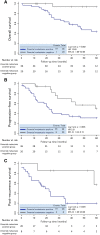Omental metastasis as a predictive risk factor for unfavorable prognosis in patients with stage III-IV epithelial ovarian cancer
- PMID: 33512628
- PMCID: PMC8055622
- DOI: 10.1007/s10147-021-01866-3
Omental metastasis as a predictive risk factor for unfavorable prognosis in patients with stage III-IV epithelial ovarian cancer
Abstract
Background: Epithelial ovarian cancer has a clear predilection for the omentum as the site of metastasis; however, its contribution to clinical outcomes remains unresolved. This study aimed to evaluate the prognostic significance and efficacy of chemotherapy in the presence of omental metastasis.
Methods: A retrospective cohort study was performed in 56 patients with stage III-IV ovarian cancer who underwent primary debulking surgery between 2004 and 2018 at Kumamoto University Hospital.
Results: Thirty-six (64.3%) patients were categorized into the omental metastasis-positive group, whereas 20 (35.7%) patients were in the omental metastasis-negative group. The 5-year overall survival rates were 43.4% in the omental metastasis-positive group and 93.8% in the omental metastasis-negative group. Statistically significant differences were observed in overall survival (p = 0.002) and progression-free survival (p = 0.036) between the omental metastasis-positive and metastasis-negative groups. Notably, multivariate analysis demonstrated that the existence of omental metastasis is an independent risk factor for overall survival in patients with stage III-IV ovarian cancer (hazard ratio 8.90, 95% confidence interval 1.16-69.77; p = 0.038). Furthermore, the omental metastasis-positive group had significantly lower overall response rates to chemotherapy for recurrent disease, compared to the omental metastasis-negative group (31.6% vs. 85.7%, p = 0.026).
Conclusion: Our present data demonstrated that omental metastasis is closely associated with an unfavorable prognosis due to increased chemoresistance in patients with stage III-IV ovarian cancer. Elucidating the biological mechanism of omental metastasis will shed light on novel therapeutic approaches for the management of advanced ovarian cancer patients.
Keywords: Chemoresistance; Omental metastasis; Ovarian cancer; Prognosis.
Figures


References
LinkOut - more resources
Full Text Sources
Other Literature Sources

